'One of the hardest courses I've ever swum': Competitors feel Sentosa heat at World Aquatics Championships
A number of factors including water temperature and choppy conditions made the race a particularly difficult one, said competitors.
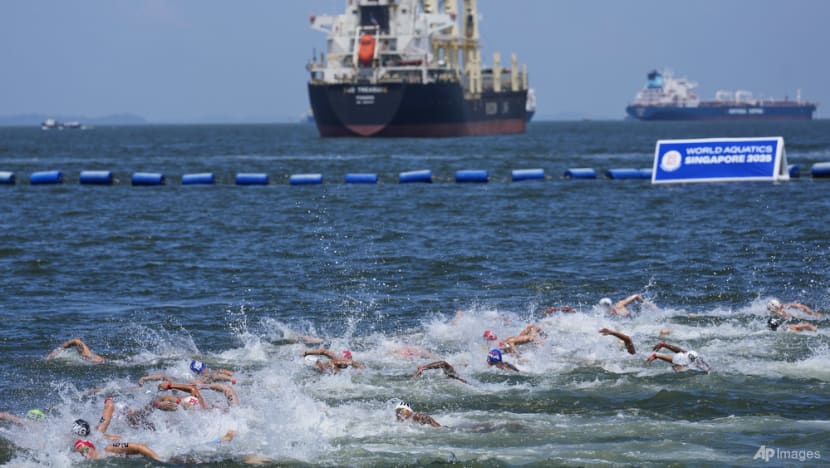
Swimmers compete in the men's 10km open water swim at the world swimming championships in Singapore, Wednesday, July 16, 2025. (AP Photo/Vincent Thian)

This audio is generated by an AI tool.
SINGAPORE: The water quality off the Sentosa coast has been under the microscope in recent days, but it was factors such as the afternoon heat which proved brutal for competitors on Wednesday (Jul 16) in the World Aquatics Championships.
The men's 10km open water race was won by Germany's Florian Wellbrock, while Italy's Gregorio Paltrinieri took silver and Australia's Kyle Lee clinched the bronze after seeing off Germany's Oliver Klemet.
A total of 11 competitors did not finish the men's race including Singapore's Ritchie Oh, three did not start, and five recorded times that were over the allocated time limit.
In comparison, the last world championships in Doha had one competitor who did not finish and one with a time over the allocated time limit.
In the women's 10km open water race later in the afternoon, Australia's Moesha Johnson won gold, while Italy's Ginevra Taddeucci clinched silver and Monaco's Lisa Pou claimed bronze.
Fifteen competitors did not finish the women's race, one did not start, and one recorded a time that was over the allocated time limit.
In comparison, the last world championships in Doha had three competitors who did not finish and one with a time over the allocated time limit.
According to World Aquatics regulations, the water temperature in an open water swimming competitions should be a minimum of 16 degrees Celsius and a maximum of 31 degrees Celsius.
In response to queries from CNA, organisers said that the official water temperature reading for the men's race was 30.4 degrees Celsius and the women's race was 30.8 degrees Celsius.
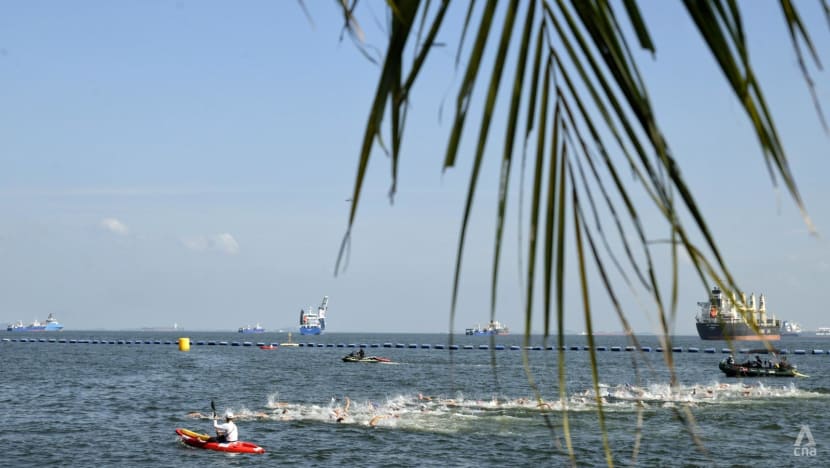
"To be honest, it was tough today," said Wellbrock, who was the 2020 Olympic champion in the event. This is his third open water world title after wins in 2019 and 2023.
"I think it was the warmest water ever that we've had to race in. But we had like one year to prepare for this, we did a lot of heat training and I think this was the key for today to take the gold."
Hungary's Kristof Rasovszky, who was the reigning champion and 2024 Olympics champion in the event, described it as one of the "hardest" races he's competed in given factors such as the heat and the choppy conditions.
"It's a really challenging experience but it was all the same for everyone. So you can't really say that this was the problem because everyone had to swim in the same conditions," said Rasovszky, who said he once competed in similarly warm conditions during the 2019 Beach Games in Doha.
"This is open water, so you have to prepare for everything, for the warm and for the cold."
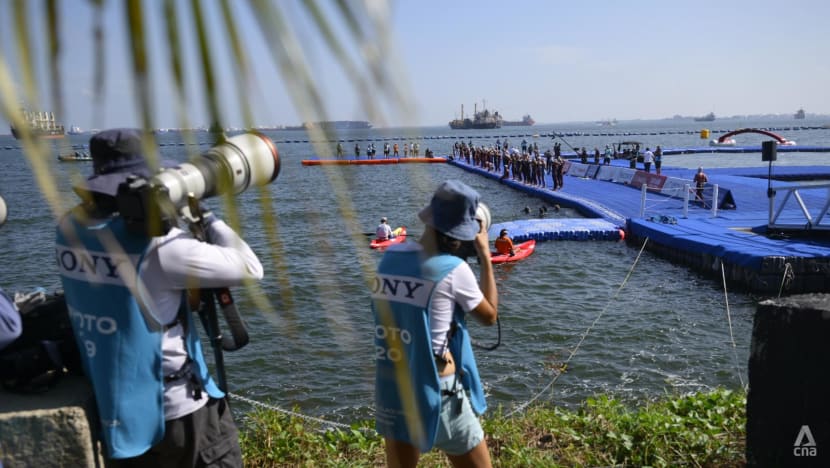
Singapore's Artyom Lukasevits said that the difficulty of the course was down to a number of factors. He finished 43rd, making him the best-placed Southeast Asian men's competitor.
"It was not just the heat, it was a combination of other stuff. It's a pretty choppy course ... and it's also a big race," said the 20-year-old.
"It's one of the hottest, if not the hottest ever. And everybody's just kind of fighting for their life, so it's really difficult."
The women's 10km winner Johnson, who clinched silver at the Paris Olympics, said that Wednesday's race posed the "most challenges" an open water swimmer could face.
"We had current (in the river Seine) but we had current here today, we had hot water, we had waves, we had a bigger field and 36 hours delay with uncertainty. So I think that's the most challenges an open water swimmer can face," she said.
"To everyone here who competed and completed the race, you should be proud of yourself."
She added that she had prepared for the race by training in a short course pool with a temperature of 30 degrees Celsius.
DEALING WITH POSTPONEMENTS
On Tuesday, the women’s 10km race was postponed just hours before it was set to begin, with organisers saying that the water quality levels did not meet "acceptable thresholds" as a result of an analysis of samples taken last Sunday.
The race, originally slated for 8am on Tuesday, was initially pushed back to Wednesday morning.
World Aquatics executive director Brent Nowicki said later on Tuesday afternoon that elevated levels of the E. coli bacteria were responsible for the race postponement. He added that the source of the contamination had yet to be determined.
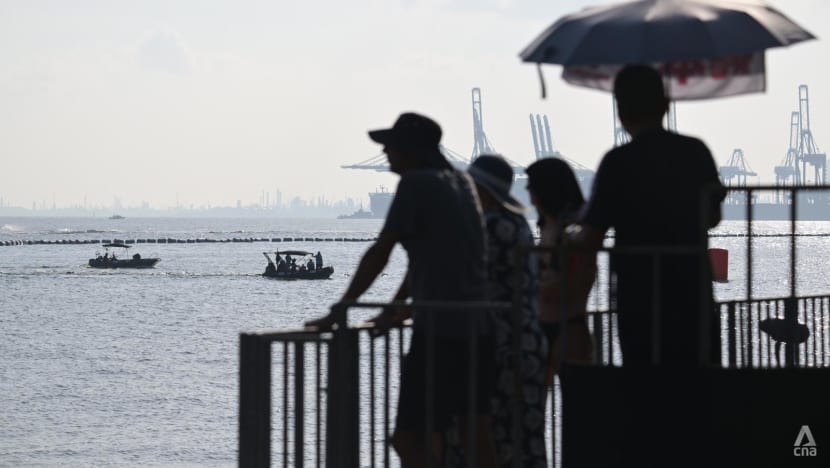
E. coli are bacteria typically found in the intestines of humans and animals. Common symptoms of ingesting a pathogenic strain of E. coli include vomiting and diarrhoea.
Later on Tuesday, World Aquatics said that water quality results had "improved", but further tests showed that levels still exceeded "acceptable thresholds" after testing conducted earlier in the day.
This meant that the men's 10km race and the women's 10km race, which were scheduled for 7.30am and 10.15am on Wednesday, were postponed to 1pm and 4pm on Wednesday.
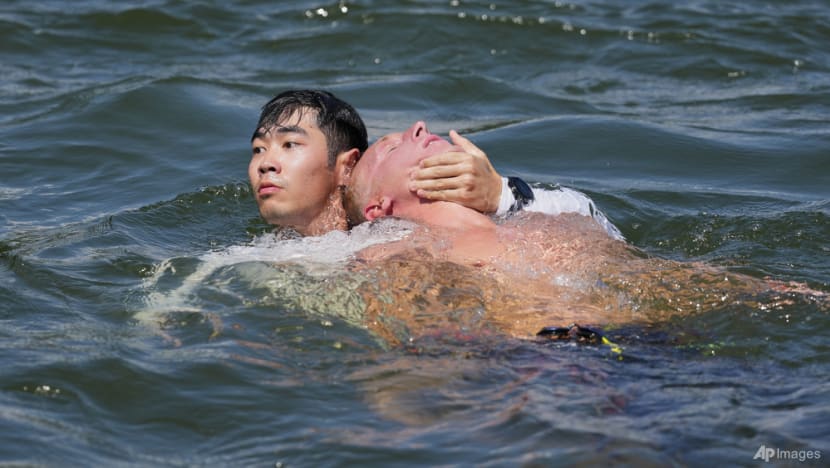
On Wednesday morning, the events were given the green light by World Aquatics after water quality results showed "significant improvement".
In a press release, the sport's governing body said that the results from three samples taken along the competition course at 5pm on Tuesday showed the levels of E. coli bacteria falling between the ranges of "good" and "excellent" according to World Aquatics and the World Health Organization (WHO) regulations.
"Regular water quality monitoring and testing continues throughout the competition period to ensure athlete safety, with the health and safety of all participants continuing to guide all competition-related decisions," said World Aquatics.
World Aquatics did not state the E.coli readings when announcing the two postponements and when it subsequently decided to proceed with the races.
Speaking to reporters, Singapore's Chantal Liew who finished 40th overall and was the top Southeast Asian competitor in the women's race said she took the postponements in her stride.
"That's just part and parcel of being an open water swimmer," she said. "Athlete safety is still the most important thing and I think overall they made the right decision."
The changes had a knock-on effect on preparations but are part and parcel of racing, said Rasovszky.
"We didn't know in the morning when we woke up if there's going to be a race or not ... And then we had to wait till the later morning (to know) if we're going to race in the later afternoon," he added.
"It's not an easy thing, and it's not really good for the preparation like a day before the race. But this is how it works in the open water."
At last year's Paris Olympics, pollution in the Seine after heavy rains caused the men's triathlon race to be postponed for a day, after swimming practice sessions were cancelled two days in a row.
"We didn't really feel anything from it (the water quality). We will see two days later if someone is out of the race because of some sickness or not ... But I believe in the organising committee, and in World Aquatics that they try to do their best," said Rasovszky.
"As far as the E.coli is concerned, I drank a lot of water during the race today, so hopefully I'm fine tonight - we'll see," added Liew with a laugh.
Speaking to CNA, Indonesia's Aflah Prawira said he supported the decision to postpone the race, despite the tough conditions brought about by competing under the afternoon sun.
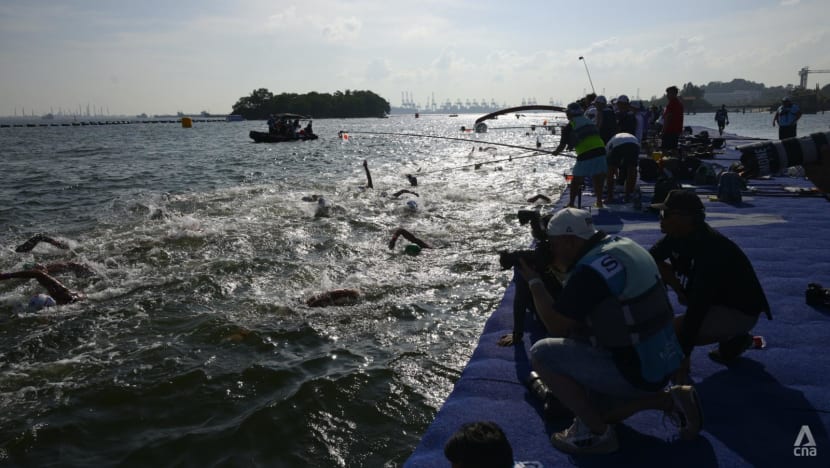
He said he had raced in similar temperature conditions back in Papua, but in waters which were less choppy.
"It's one of the hardest courses I've ever swum. It's the weather - the heat from the outside, the choppy water ... very difficult race also because we started in the afternoon," he explained.
"But I think the decision made by World Aquatics is the best decision."
Women's champion Johnson also thanked organisers for allowing the event to proceed.
"Hats off and thanks to the organisers for actually allowing this to go forward. It's very challenging conditions and a lot of ifs, buts and maybes about whether the race would go ahead, but to put this on and continue to allow us to race - thank you very much," she said.

















